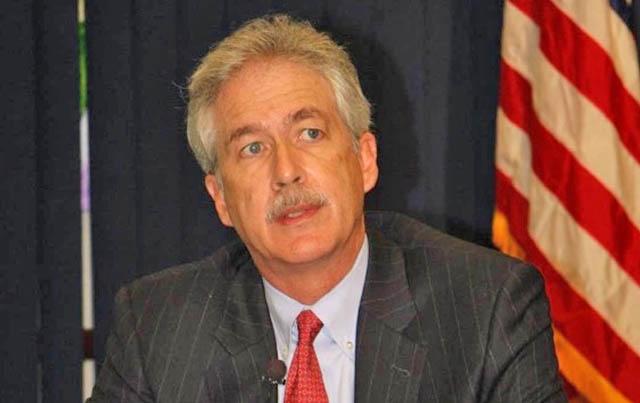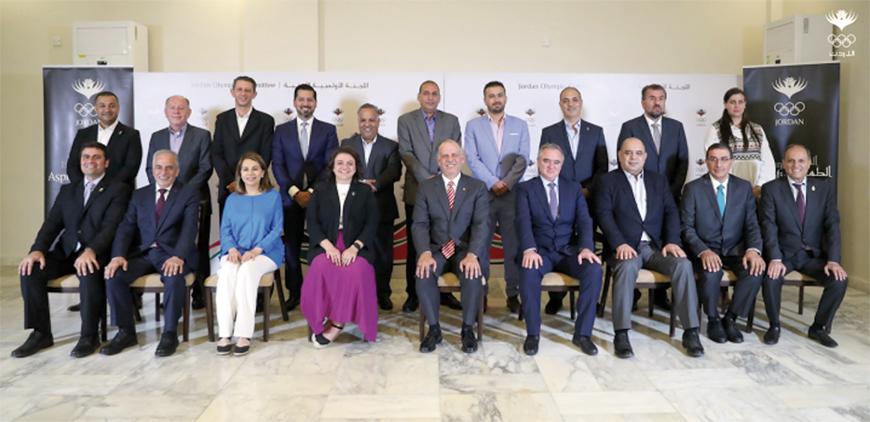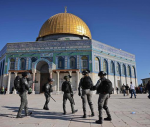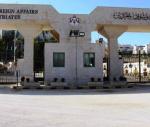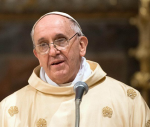You are here
A lot has changed but not my appreciation of Jordan’s role –– Burns
By JT - Jan 28,2014 - Last updated at Jan 28,2014
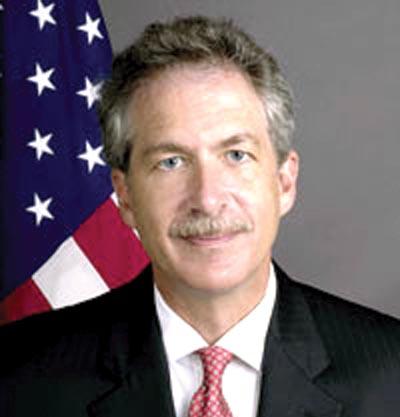
Following are remarks by Deputy Secretary of State William J. Burns during his meeting with chief editors of Jordanian newspapers at the US Embassy in Amman on Monday, January 27, 2014:
Deputy Secretary of State Burns: It is very nice to see all of you and I am very happy to be back in Jordan. Some of my very best memories of my thirty two years as an American diplomat are of my service in Jordan. I was here first as a very junior diplomat in the early nineteen eighties and then returned fifteen years ago as Ambassador.
Certainly a lot has changed over all those years, but one thing that hasn’t changed is my deep appreciation of Jordan’s role as a force for stability and moderation in this region and my deep appreciation for the capacity of Jordanians for tolerance and pluralism. Those are qualities that are in short supply in this region today. And that makes the vitality of Jordan and its role more important than ever.
I’m glad to reaffirm the strong and enduring United States’ commitment to partnership with Jordan. I was glad to have the opportunity today to review a number of key issues in the region and in our relationship with the Prime Minister, the Foreign Minister and the Chief of the Royal Court, and I look forward very much to seeing His Majesty King Abdullah later in my visit.
In our meetings today, we discussed our common concern about Syria, and the terrible consequences of a continuation of the Syrian civil war for Syrians and for the whole region.
We both strongly support the Geneva II process. Neither of us have any illusions. Geneva II is the beginning of a long and difficult process aimed at political transition. Along the way, it may be possible to take steps such as local cease-fires, prisoner exchanges, and greater humanitarian access. But the key will remain the transition to a new leadership. That’s the purpose and the aim of the process. The truth is, as Secretary Kerry has emphasized, that Bashar Al Assad has become a magnet for violent extremists and the longer he stays in power the more dangerous the situation becomes for Syrians and for the region. We feel a similar sense of urgency about the refugee burden created by Syria’s civil war, a burden which has fallen heavily upon Jordan. The Secretary announced recently in Kuwait a significant increase in the amount of American humanitarian assistance for the Syrian refugee challenge, which now totals $1.7 billion, a significant portion of which has gone to Jordan. I want to re-emphasize my own appreciation for the generosity which Jordanians have demonstrated in taking into their country Syrian refugees. I know this places a huge burden, especially on Jordanian communities in the north of the country. A lot of people don’t appreciate that 80% of Syrian refugees in Jordan live in Jordanian communities outside of refugee camps, so that’s why in addition to the humanitarian assistance that I have just described, the United States has stepped up development assistance in Jordan, so that we can help provide to all the residents of those communities, Jordanians and Syrians alike, increased access to education, housing, health care, water and other basic needs.
We also discussed in our meetings today the importance of Palestinian/Israeli negotiations, on which the United States continues to consult very closely with Jordan. We deeply appreciate Jordan’s constructive role, the role it has played now for many years, our support of a two-state solution. We clearly understand Jordan’s profound stake in this process, and Jordan’s profound stake in progress toward a two-state solution, as well as the importance of addressing Jordan’s interests along the way. President Obama and Secretary Kerry are strongly committed to achieving a final status agreement and we have no better partner in that effort than King Abdullah.
I also emphasized in my meetings today the commitment of the United States to support Jordan’s economic modernization and reform. U.S. assistance to Jordan has reached about $1 billion in total assistance in each of the last couple of years. I know the process of reform is not easy for Jordanians, but I also know that continuing down the path of economic and political reform outlined by the King is crucial to Jordan’s future as Jordan seeks to realize the full potential of what I have always seen to be the greatest resource of this country, the talent and creativity of its people. It’s not easy to create economic opportunities. It’s not easy to build political transparency or respect for political pluralism. And it’s not easy to fight corruption. But all of those efforts are deeply in the self-interest of Jordan and Jordanians in the months and years ahead. So in a region with more than its share of challenges and uncertainties, the U.S.-Jordanian partnership matters today more than ever. I’m glad to have a chance today to emphasize once again our commitment to that partnership, and I’m glad now to take your questions. So thank you again for taking the time today.
Faisal Al Shboul (Petra News Agency): If you were a Jordanian, when you will accept or refuse any framework agreement between the Palestinians and Israelis, especially in the three main issues: borders, refugees as well as Jordanians.
Deputy Secretary of State Burns: Obviously I cannot speak for Jordanians. Jordanians, in my experience, are quite capable of making their own decisions. What I will say is what Secretary of State said in Davos a few days ago and that is the United States recognizes the crucial importance of making progress towards a two-state solution and recognizes our own responsibility to help make that possible. We cannot make choices for Palestinians and Israelis, but we will do everything we can to make progress not just towards a framework but towards a permanent status solution. As I emphasized in my opening comments, we also recognize the importance of Jordan’s role, the stake that Jordan has in all of these issues, and the importance to us of consulting very carefully throughout this process so that Jordan’s interests are taken into account. I think Secretary Kerry’s frequent visits and frequent consultations with the Jordanian leadership make that commitment clear.
Jumana Ghneimat (Al-Ghad): I want to ask about Syria and the crisis there. Here among Jordanians, the impression that the U.S. doesn’t want to finish the struggle of the Syrian people, and that feeling started as soon as the chemical weapons settlement. So, how could the U.S. convince the Arab world that they want to finish the crisis there and get rid of Bashar? What’s going on land is different than in the concept, it’s different from the public speech.
Deputy Secretary of State Burns: Certainly the situation on the ground is a deeply tragic one for Syrians, and it carries enormous dangers for Syria’s neighborhood and, in particular, for Jordanians. What the United States continues to try to do is to emphasize the importance of a political solution and emphasize that there can’t be a political solution without a transition to a new leadership. And that’s the purpose of the Geneva process, and that’s what Secretary Kerry has continued to emphasize. At the same time, we have provided strong support for the Syrian opposition, so that it can feel the confidence to push for that kind of a political solution, and we work with a number of other partners in the region and around the world to help provide that support. And third, as I said before, we are very mindful of the dangerous consequences of the spillover of that conflict into a region which already has more than its share of instabilities and fragilities. And so that’s why we have tried to address not only the humanitarian needs of refugees, but also the development needs especially of Jordan, a country which has borne a huge burden in the Syrian refugee crisis. We have tried to step-up our assistance to those communities in Jordan which feel the effects of the Syrian refugee crisis. So, in all those areas, we will continue to do everything that we can, recognizing that the longer this crisis goes on, the longer the bloodshed and the civil war in Syria continue, the more dangerous it is, not only for Syrians, but for the whole region. I think that is a concern that is widely shared, and it’s certainly shared in Jordan and provides a basis for us to redouble our efforts in the months ahead.
Samir Barhoum (Jordan Times): Mr. Burns, I would like to go back to the Palestinian/Israeli situation. All of Jordan is concerned regarding the refugees, there is so much talk or leaks about keeping refugees here in Jordan and this is a big concern for many Jordanians. A lot of commentators are complaining that Jordan is being kept in the dark about it.
Deputy Secretary of State Burns: It is simply not true that Jordan is being kept in the dark about anything; both the President and Secretary Kerry take very seriously our partnership with Jordan. We consult very carefully with Jordan at every stage of this process, and as I said, we attach great value to the constructive role that King Abdullah and the Foreign Minister continue to play in trying to make progress on this issue. As I said before, we recognize very clearly the significance of progress toward a two-state solution for Jordan’s future as well as for the Palestinians and Israelis.
Samir Barhoum (Jordan Times): Refugees?
Deputy Secretary of State Burns: One of the biggest challenges in making progress not just towards a framework but towards a permanent status solution is to develop a just and agreed solution to the Palestinian refugee issue, and that’s exactly what Secretary Kerry has committed to doing. It’s not an easy challenge, but it is one which will be crucial to producing that kind of permanent status solution.
Samir Barhoum (Jordan Times): And we have also contacts with third party countries to host more refugees like Australia or Canada? Is that true?
Deputy Secretary of State Burns: I don’t want to get into the details of the negotiations. I think Secretary Kerry has done a remarkably good job of preserving the privacy of this process. But what I would simply re-emphasize that we take into account very clearly the concerns and the interests of Jordan, both on the refugee issue and on a range of other issues.
Faisal Al Shboul (Petra News Agency): For all people, the question is, will we be at the table or near the table?
Deputy Secretary of State Burns: As I said before, Jordan has played a very effective and very active role in this process. I think Jordan’s interests are clearly and consistently being taken into account, and I think Jordan is making an important contribution to the progress that we have seen so far and hopefully the progress we will see in eventually reaching a final status solution.
Jumana Ghneimat (Al-Ghad): Can I ask about Iran, the new agreement between the United States and Iran. In the last few months, we started to witness some change in the relationship between the United States and Iran. How does this affect other partners in the Arab region? How does it affect the relation with other countries, like Saudi Arabia and Gulf in general?
Deputy Secretary of State Burns: That is a very good question, because we’ve been very mindful in our dealings with Iran on the nuclear issue to remember all the other areas of Iranian behavior that threaten the interests of our friends and partners in the region and threaten American interests, whether in Lebanon or Syria or Yemen or any place else in the region. We’ve been very direct in making those concerns clear. The nuclear issue is the most immediate of the challenges that Iran poses, and so we engage both directly and bilaterally with Iranians and also worked very actively within the P5+1 group to try to make progress towards a diplomatic resolution of the nuclear issue.
We reached a first agreement, which in essence caps the Iranian nuclear program. It stops further progress and in a couple of respects rolls back the Iranian program. It creates the basis for negotiations for the P5+1 and Iran for a comprehensive solution. I have no illusions about how hard that is going to be, but it’s important to test that proposition because I think as long as there is a diplomatic possibility of resolving this issue, and by resolving it I mean an outcome in which Iran has a civil-nuclear program but one that is devoted to exclusively peaceful purposes, one that doesn’t allow Iran to develop a nuclear weapon. That’s very much in the interest not just of the United States but of the entire region. That will still leave a number of very important issues on which we have some profound differences with Iran and on which we share a lot of concerns with our friends in the region. We will continue to try to be very direct about those just as we have been on the issue of Iran’s participation in the Geneva conference.
Samir Barhoum (Jordan Times): I believe there is a visit arranged for his Majesty to visit the United States next week. Do you have a comment on that?
Deputy Secretary of State Burns: I’ve learned over the years not to get ahead of the White House in making announcements about visits. All I can tell you is that I know the President looks forward very much to the next opportunity to meet His Majesty King Abdullah and I think that when they do meet it will be an opportunity to highlight the importance we attach to partnership and consultation with Jordan on the Palestinian issue, on Syria, and lots of other issues.
Narrator: (We’ve time for one more question)
Samir Barhoum (Jordan Times): I have two issues really, first was a rupture in the Saudi Arabia and how is the relationship with Saudi Arabia progressing?
Deputy Secretary of State Burns: What is ruptured?
Samir Barhoum (Jordan Times): Ruptured ties with Saudi Arabia
Deputy Secretary of State Burns: I don’t believe we have ruptured ties with Saudi Arabia. The United States continues to attach a great deal of importance to the U.S.-Saudi relationship and we share a number of very important common concerns in the region. We’ll continue to work very hard in that relationship because I think it’s in the interest of the United States and Saudi Arabia. It has been a relationship that has been important to both of us for many years and I’m sure will continue to be.
Samir Barhoum (Jordan Times): Let us go to Egypt now. We understand there are lots of inconsistencies in the United States’ stance since the beginning of the Arab Spring, the fight for democratization, the Islamists taking over, then now supporting Sisi, and the situation in Egypt is getting worse nowadays.
Deputy Secretary of State Burns: I think Egypt obviously plays an enormously important role in the Arab world and in the region. Egypt is wrestling with a very complicated transition beyond the revolution which took place three years ago. We fully appreciate how complicated those challenges are, and we attach a lot of importance to our partnership with Egypt and to the role that Egypt can play in the years ahead. We attach a lot of importance to helping to revive the Egyptian economy and we will continue to support a political process in Egypt which acknowledges the dignity of each Egyptian citizen, which allows for political pluralism and respect for the rule of law, which allows for political processes without intimidation or coercion, which allows players in that political process who are committed to peaceful rules of the road to participate, and which underscores the importance of accountability in governance. All those are easy qualities to talk about and hard to apply. But they are very important for Egyptians. There is no mistaking the importance the United States attaches to Egypt or to our relationship, or to the role that Egypt can and must play in this region.
Jumana Ghneimat (Al-Ghad): I would like to ask about the political and economic reforms here in Jordan. As you said before, reform is not easy, it’s hard especially political reform, and I think that Jordan is doing well in economic reform, but we still have a gap between political and economic reforms in Jordan. Are you going to discuss this issue with his Majesty or with the Prime Minister on what’s the next plan in Jordan especially for political reform?
Deputy Secretary of State Burns: As I mentioned in my opening comments the United States has supported, in the self-interest of Jordanians, the process of economic modernization and political openness. King Abdullah has talked quite extensively about his own vision of how to make progress in those areas in Jordan. And as I said in my opening comments, I recognize that none of this is easy but I think progress in both directions remains extremely important for the future of Jordan. It is important to strengthen over time an economic system which opens up opportunities for all Jordanians, and that means focusing not just on microeconomic issues but also focusing on education, focusing on those areas in which young people can equip themselves to compete in the modern global economy. And it also applies to making steady progress in opening up political opportunities and political participation in developing the rule of law, in developing respect for political pluralism. That’s very important for the health of any society in the 21st century. I think Jordanians are entirely capable of making progress in those areas. As Jordan moves ahead toward economic modernization and moves ahead toward economic and political reform, the United States will do everything we can to remain a strong and effective partner.
So thank you all very much.
Related Articles
The US takes into account the concerns and interests of Jordan in the ongoing efforts to find a solution to the Palestinian-Israeli problem and is in continuous contact with the Kingdom on the progress of these endeavours, US Deputy Secretary of State William Burns has said.
AMMAN — The General Assembly for the Jordan Olympic Committee (JOC) has re-elected HRH Prince Feisal to serve another four-year term as pres
Foreign Minister Nasser Judeh on Monday discussed with US Deputy Secretary of State William Burns bilateral ties and the latest regional developments, especially the peace process and the situation in Syria.


